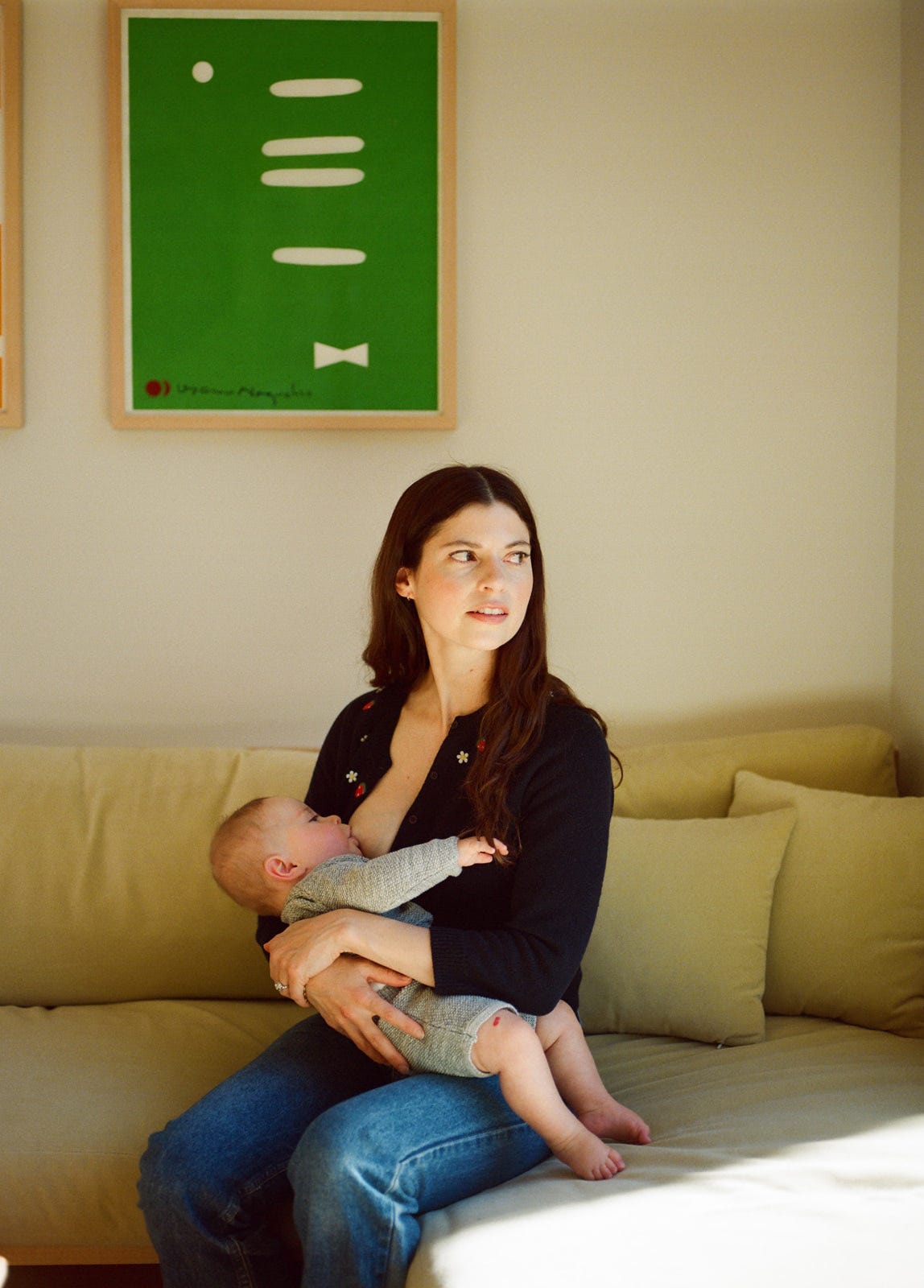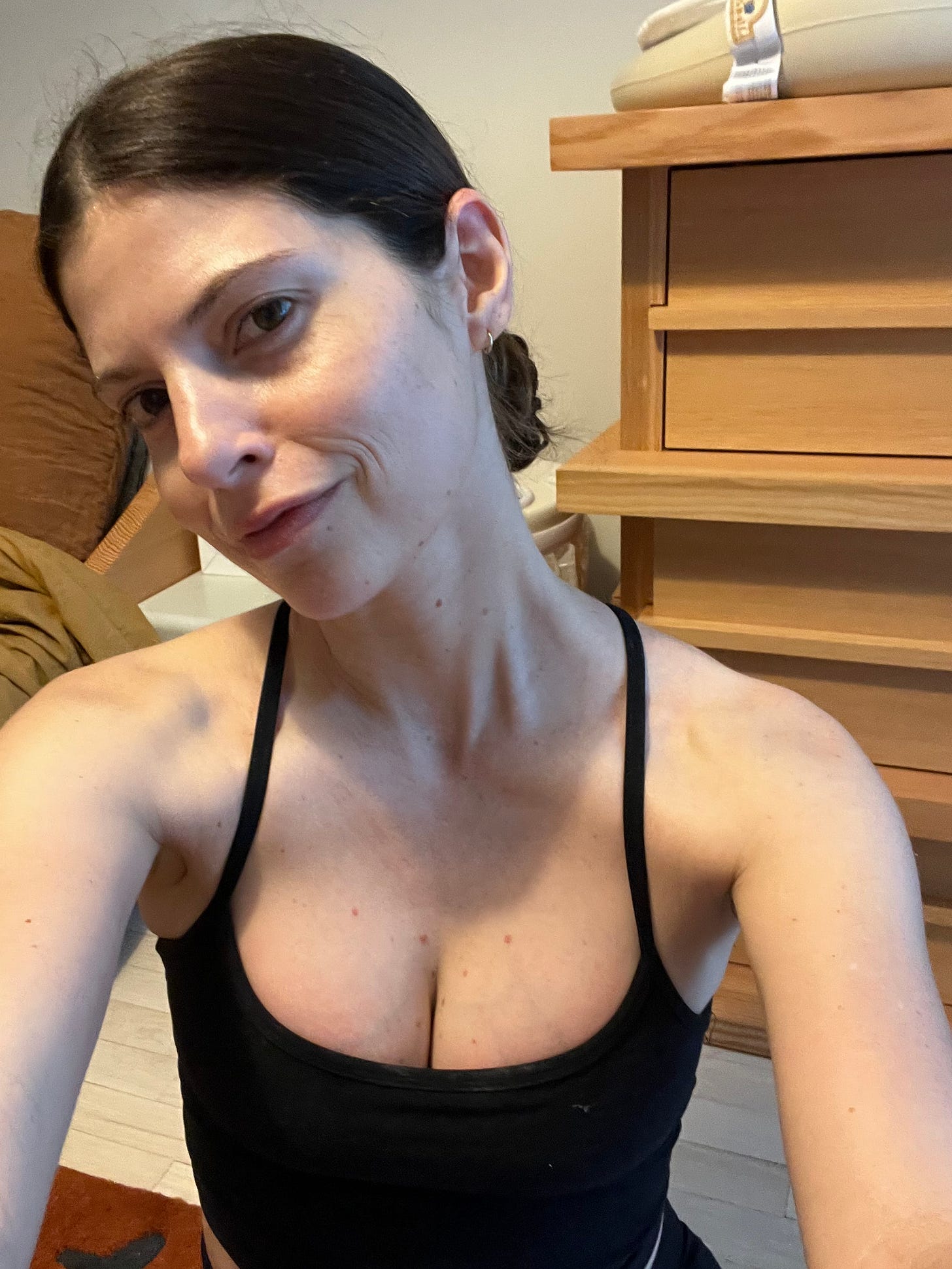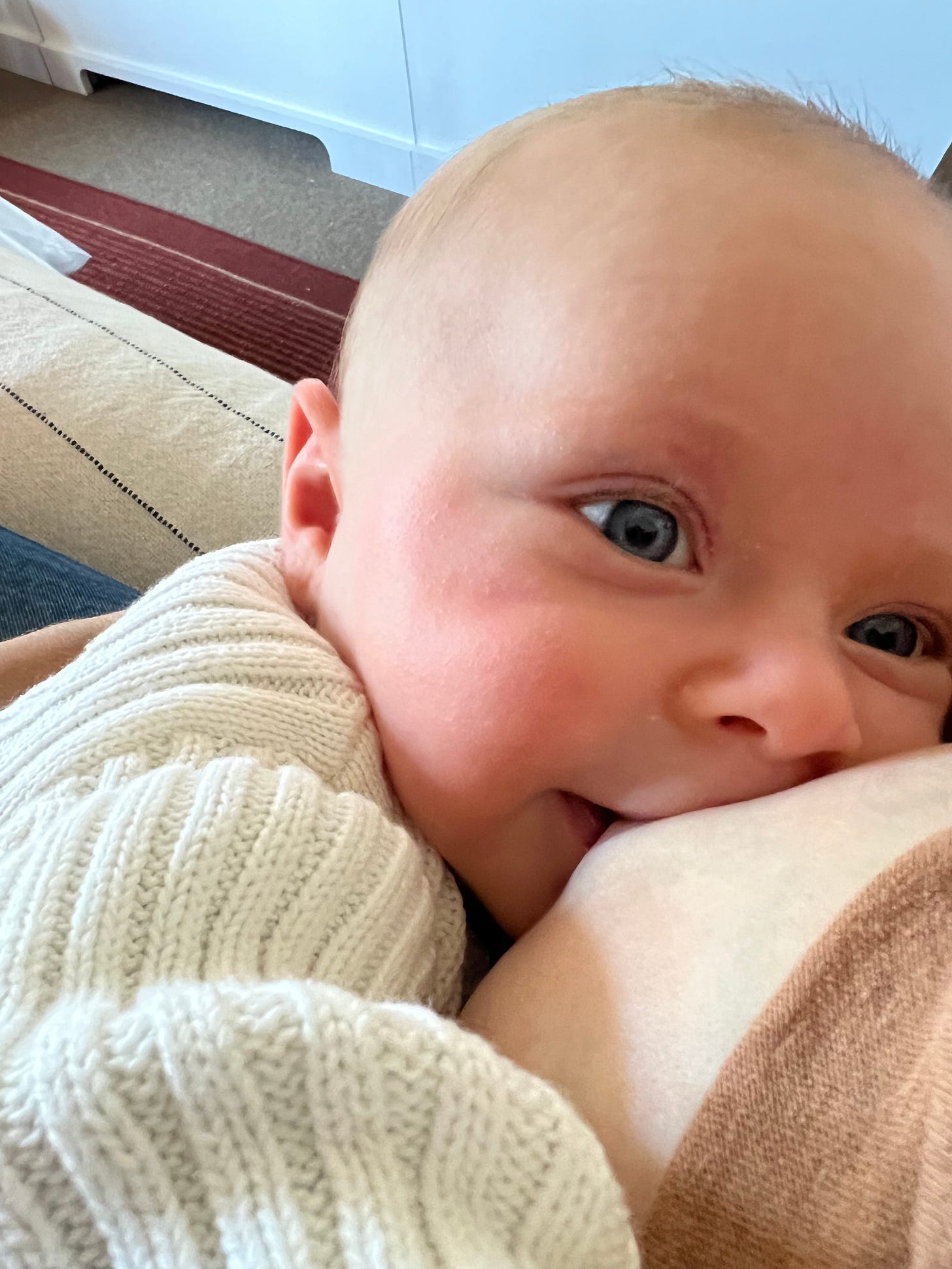Hi,
I’m doing my best to restore some normalcy post-fires, but the heaviness in L.A. is pervasive and I suspect it will be for a long while. I hope everyone’s doing ok.
Some housekeeping - I’m going to change up the frequency and format of this letter. Ideally, I’ll still be able to do two essays a month (although some months there might just be one) and one interview, but the recipe series is going to be more sporadic and may just live on Instagram, I haven’t decided yet. When I do post recipes, they will likely be more adult-focused, think quick and easy lunches, that sort of thing.
If you were here mostly for the food stuff, I’m sorry! But, I’m not monetizing this thing right now and to be completely transparent, just because I think it’s helpful for people to know, Louis isn’t in school yet and my childcare is part-time. Since I’m a freelance writer, sometimes I have a lot of work and sometimes I don’t, but when I have a lot (like last month) I learned that it’s near impossible to churn out as much material as I was previously, and I really want to be consistent here. I hope you understand!
I appreciate all of you so much and thank you for giving me space to figure this thing out!
And now, breastfeeding! Yeehaw!
The first question that arises for most new moms is, “When will I sleep again?” The second is, “When will I feel like myself again?” I didn’t feel like “myself” until I stopped breastfeeding. (I’m using quotes here because “myself” is subjective, you’re never really the same after having kids.)
My goal was to breastfeed for a year and I ended up doing it for almost eighteen months. I closed the door on that chapter in November and since then I’ve been thinking a lot about what the experience was actually like for me. Interestingly, reflecting on it has not been what I expected. I have countless sweet memories and even knowing what I know now, I probably wouldn’t do anything differently if I could (I’m an Aries after all), but that doesn’t mean the choice to breastfeed long-term was actually right for me. It was extremely challenging and I don’t just mean physically.
I mean, that for the entire first year of motherhood, I had no clue about the way that breastfeeding can affect you physiologically and emotionally other than the fact that you release the “feel good hormone” oxytocin when you nurse and that, obviously, something was happening in order to make milk. I had no idea that on a hormonal level, breastfeeding was most likely a driver of my postpartum anxiety and depression. What I could have done with this information would have been up to me and I understand the nuance required to try and communicate this message to someone who wants to breastfeed (and I very much wanted to and did), but I also believe that someone should have told me this along the way, which is why I’m now telling you.
Like most things involving pregnancy and birth, however, my feelings around breastfeeding are complicated. There were so many things that I loved about it, not least of which was the way it re-framed my relationship with my body. I have a few autoimmune issues that make it hard for me to trust that my body will function the way it’s supposed to. I’m used to it attacking itself and getting it wrong (although, being able to carry a pregnancy did help with this). But, making milk for my tiny 5 pound, 4 oz baby when he was born? This, my body got right and I was in awe that it got this right. I was in awe that I could provide the sole source of nourishment for this thing that I had spent nine months growing. Me. I remember going to an early pediatrician appointment and my doctor expressing amazement at how much weight Louis had gained. “I did that,” I thought. Holy shit.
I loved the closeness of breastfeeding and the comfort it brought. I loved how once we got the hang of it (nipple to nose, boob like a taco), Louis knew exactly what to do. We had a rhythm, this thing that was just ours. I loved in the beginning how he would immediately fall asleep sitting upright against my bent legs in the rocking chair, milk drunk and content; that anytime he woke up crying in the middle of the night, the boob would usually do the trick to quell him. I geeked out over my milk’s ability to change its composition to help Louis fight off sickness (apparently I like science?) It was like my milk had its own little brain. I loved how he would reach up and touch my face as he was nursing, bright-eyed and toothless. And, as someone who typically wears an A-cup, I fucking LOVED having big boobs for a minute. Boobs that looked-amazing-in-a-sports-bra boobs. Boobs that could-measure-up-at-a-porn-convention boobs. Sorry. But, I did! I loved it!
As much as I loved it though, there were plenty of things that I hated about it. When people hear “breastfeeding is a full-time job,” they don’t actually hear that breastfeeding is a full-time job and I think that’s because 1. People are dumb. And 2. We’re conditioned to undervalue and undercut mothers at every turn. But there is no other way to describe it. If you are exclusively breastfeeding (which I was), you are keeping a baby ALIVE with your own body (hello?!) for the first year of their life! (Solids are secondary lest we forget.) How could that not be a full-time job?! And yet, I think all the time how if I had a traditional job that I had to go back to at 4 months postpartum, there’s no way I would have been able to breastfeed for as long as I did. But, that’s another topic.
While I marveled at this bodily feat, there were times were I felt like a prisoner of my own making. You are adjusting to so much change over the course of your first year as a mom that all you want is a little normalcy, a little reminder of what life used to be like so that you can carry on with what life’s like now. But, every time I went out alone, there was a three hour timer in the back of my mind. If you live in L.A., you know that you really can’t do much in three hours. I had a hard time enjoying a much-needed lunch with a friend baby-free or a blessed afternoon running errands because I knew I had to mind the clock and either get back home to nurse or pump. There is no worse feeling than thinking your baby might be hungry and you aren’t there. I just kept thinking that I had already carried a baby for nine months and not only was my body still not my own post-birth, time wasn’t even my own.
And then of course, there were the near constant thoughts about milk supply. The amount of mind-space taken up by whether or not I was making enough milk was dizzying. I experienced a pretty big dip in mine when Louis started sleeping through the night at two months (don’t worry, this didn’t last). So, for the majority of Louis’ first year, I would feed him five-six times a day for around fifteen minutes at a time (this was because he stopped gaining weight the way the pediatrician wanted him to) and pump after I put him to bed at the suggestion of my lactation consultant. This worked, but I don’t know one woman who wouldn’t be happy if a dump truck dropped every pump on the planet off a very high ocean cliff. I say ocean because God forbid the pump doesn’t die on impact and the sound lives on.
Some other things I hated since we’re here? The period where I was waking up to pump at 3 A.M., the countless painful engorgements, the judgement that comes with breastfeeding past a few months (you’re damned if you do, damned if you don’t), the bit where Louis choked on milk when he fed, the cluster feeds and the obsession every mom has, breastfeeding or not, with your baby getting enough food.
Sometimes, usually after I’d been up most of the night, I felt like I was killing myself trying to uphold this easy, breezy, earth mama, whip-the-boob-out-of-my-Doen-peasant-top whenever, wherever ideal. The mental load of breastfeeding combined with the physical demand was immense. Whenever I expressed this to my husband he would say, “Why don’t you just stop?” and I would become quietly (and other times, not so quietly) enraged. Yes, exclusive breastfeeding was a choice, but it was my choice and for my own reasons, it was important to me. Most men do not understand the emotion behind breastfeeding, just as they can’t ever really understand the profound and long-lasting effects that giving birth has on the birthing person. He didn’t get how conflicting it was to crave bodily autonomy while also not wanting to compromise this superpower that stopped tears and satiated hunger and provided an incomparable sense of safety for both of us. When he said things like this, I wanted to kill him.
The thing is, while I knew that breastfeeding was fucking hard, I thought that that’s all it really was, hard. It was my choice not to introduce formula and I needed to suck it up! I didn’t think so much about the impact breastfeeding might be having on my brain and maybe that’s what was making it so hard, and that’s because no one told me about the impact it might be having on my brain. So when I decided to begin weaning, I had only heard a brief rumbling from my sister-in-law that stopping breastfeeding could cause a hormonal comedown akin to the baby blues. I had never been told about the possibility that a lack of estrogen, which happens when you’re breastfeeding, can contribute to anxiety and depression, either. My O.B. never mentioned it despite the fact that he had prescribed me a topical estrogen cream for another reason, and that I didn’t have a period (I had to completely stop breastfeeding for it to return). Neither did my lactation consultant.
My lactation consultant did tell me when I met her to discuss weaning, however, that breastfeeding during the second year is completely different than breastfeeding during the first. And it was! It was all of the good parts. You don’t have to pump and you get to decide when and how often you want to nurse. “You can do it once a day for two minutes and still get all of the great immune protection it provides!” she said. She had me at, “You don’t have to pump.” So, when Louis turned one, I decided to cut out the nap-time feed and stick with the morning and bedtime ones because those were the coziest. Almost immediately, I felt a shift. And not in the way I had expected. I’d been bracing myself to feel bad, but I felt really…good. I felt light. Free. I felt so good that I was like an annoying actor who’d just been bitten by the acting bug: I couldn't shut up about how great I felt.
I thought things had turned a corner for the better when Louis was about eight months old, but this was different. For the first time in a year, I felt inspired. I watched Muriel’s Wedding and actually wanted to talk about it afterwards. I felt how I used to in my twenties after I took a Soul Cycle class and had a green juice, euphoric! I had barely written since Louis was born (I hadn’t even written my birth story down) and I wanted to write again. I imagined myself like a centaur in a Greek mythology book, dancing in a circle with other centaurs, jeweled-wine-goblets raised to the heavens! Or the main character in that incredible scene from An Unmarried Woman, rising from bed to pirouette around my house to Swan Lake (if you haven’t seen this movie, please sprint). It wasn’t until I started to feel like myself again that I realized how not myself I’d been. But, not only did I feel like myself again, I was supercharged! Superhuman! A MOM WITH A MISSION.
No one told me that starting to wean would have this effect and I was confused. I thought that I must’ve gotten lucky and missed the hormonal-comedown part, or it wasn’t actually that big of a deal and that’s why the professionals hadn’t warned me about it. I thought that until my husband and I went away for the weekend. I’d brought a hand pump with me, but I was sloppy with using it. When we got back home, my supply had dropped significantly. It was right around this time that I started to feel really sad.
The sadness came on so suddenly that I couldn’t explain it. Where I had once felt light and free there was now a weight, a heaviness in my chest. I remember laying on my son’s playmat and crying while he napped, unable to pinpoint what I was crying about. When I think about those first few months postpartum, I think about a giant wave or a tornado and I see myself swept up in it, my body like a Picasso - jumbled, upside down, everything in the wrong place. This depression wasn’t like that, this depression felt chemical. Later that week, I went for a walk, and rounding the corner back to my house I thought to myself, “I get it now. I get what clinical depression feels like. I get why some people can’t go on.” My life was bleak, but I knew I didn’t have any control over its bleakness. It just was.
I argued with my husband, he didn’t understand where this was coming from. And all I could say was “I just feel so sad. I am so sad. And I don’t know why.” But, when I thought about it, I kind of did know why. The timing made sense. Because the sadness felt chemical, because there was such a stark contrast between the joy I had felt moments before and now this pain, I was able to connect the dots. I became an observer of my own self, more curious than afraid, which is why I didn’t panic straight away. My hunch was confirmed when almost as soon as the sadness came, it dissipated.
In my case, the post-weaning depression lasted for about a week and I think its relatively short duration was because I dropped nursing sessions gradually (even if I didn’t really mean to in the end). However, I know from this account by Joanna Goddard that it can last much longer and the connection is difficult to pinpoint if you don’t have the knowledge that breastfeeding can have this effect.
Which begs the question, why aren’t we given this information? While you can’t deny that a baby turns your whole world upside down and there is an inherent amount of grieving and adjusting we will all do to accommodate this enormous change, the farther out I get from my first year as a mom, the more I feel like information I could have really used was just blatantly omitted. Having awareness makes a difference, knowing the little that I did about what can happen when you stop breastfeeding made a difference because I knew that the sadness would pass. If I’d known that breastfeeding was adding to my anxiety on a physiological level, not just a surface one, maybe I would have been more vigilant about going on antidepressants or sought out more help.
Maybe my husband was right. Maybe I should have stopped breastfeeding earlier than my goal. I think that so many aspects of my postpartum life had not gone according to plan that I couldn’t imagine straying from one more thing that I’d imagined for myself as a new mom, and that’s really hard to admit. But, then I think of those moments snuggled in bed, Louis latched and looking up at me, his little laugh when I made a funny face, and it’s like I’m lying on a remote beach on the most perfect day. The water is calm, the sky is clear. I close my eyes and I can almost feel the sun on my cheeks.
That’s all for now. Next week we’re getting back to the interview series with my extremely talented friend, the artist Maia Ruth Lee. So get excited. I am.
In the meantime, if you need anything, I’m here.
Xx
Courtney









Looking at my little tit barnacle with a bit more reverence today, thanks to this.
I have a 16 month old who is completely booby mad... Like every two hours around the clock. I am losing my mind but she screams so hard if I don't so I feel like a prisoner to her. I don't know what to do!! But yes I also had the post weaning blues with my first. She stopped herself at 12 months and I was so sad the journey was over but I was amazed at how I felt too! And then two and a bit months later I got pregnant again. So four years of pretty much pregnancy, breastfeeding, pregnancy, breastfeeding. I'm exhausted!